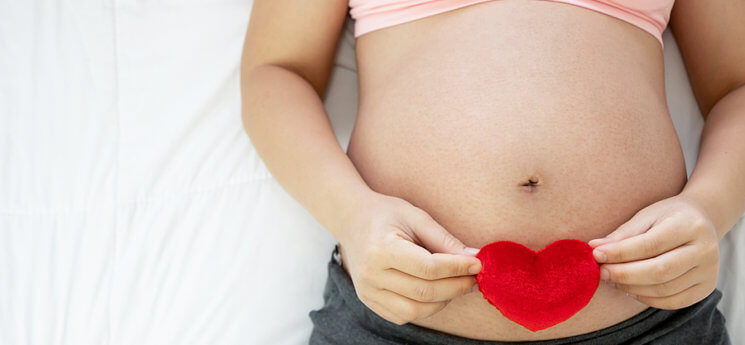Alex McCord, an actress with Bravo TV’s The Real Housewives of NYC, found the second trimester of her two pregnancies fascinating. “Of course, during the first pregnancy everything is new and depending on your outlook, either exciting or scary,” says McCord, mother to two sons, in Brooklyn, N.Y.
“I really loved being pregnant both times around and was fascinated by all the changes.” During her first pregnancy, McCord’s biggest issue was mild to moderate morning sickness that continued in the second trimester. She never allowed herself to get too hungry, which helped to ease her nausea. “Raisins and gingersnaps were the best for combating nausea, and I always tried to have a big breakfast so that I wouldn’t feel sick throughout the morning,” she says. “I craved sausage in the mornings and spinach later in the day.” Cravings do change throughout pregnancy, says Dr. Shelley Binkley, an OB/GYN at Alpine Women’s Care in Glenwood Springs, Colo.
In the second trimester, approximately weeks 14 through 26, “what was once appetizing can invoke thoughts of projectile vomiting,” says Binkley, author of DIY Baby: Your Essential Pregnancy Handbook. McCord also experienced motion sickness during her second trimester, so she tried to never take taxis. In her second pregnancy, she did not feel sick, except when she was bouncing around in taxis, but at least she could ride in them again. “Everything seemed a bit more accelerated during the second pregnancy, right down to the delivery,” McCord says.
McCord began to feel some rib cage expansion in the second trimester, which during her first pregnancy happened in the third trimester. “My belly popped out much sooner than with my first son,” she says. Read how to ease this and ALL your not-so-fun symptoms.
Second Trimester Symptoms and how to ease them
Handling Symptoms
In the second trimester, your baby is beginning to grow larger and is starting to affect your body in different ways, says Margaret Calzaretta, clinical nurse manager of maternal child health at Meadowlands Hospital Medical Center in Secaucus, N.J.
The most common signs and symptoms women may experience include the following:
- Sciatica or back aches
- Sleeplessness
- Heartburn or indigestion
- Swollen feet
- Constipation
- Dramatic changes in energy and emotions and shortness of breath also are common.
Backaches
Backaches often begin for women during pregnancy, because the usually stable joints of the pelvis begin to loosen up to allow for easier passage of the baby at delivery. “This, along with your growing abdomen, throws your body off balance,” Calzaretta says.
As the baby grows, the uterus presses on your back muscles and sciatic nerve and fills the pelvis. This can cause low back pain, lordosis (sway back), sciatica (pain that runs down the back of your leg) and pressure on the pubic bone, hip bones and lower spine, Dr. Binkley says.
All of these back symptoms are uncomfortable, but you will survive them all and almost everything will improve – after you deliver, Dr. Binkley says. “These aches and pains respond well to yoga, back stretches (cat stretches), rest and relaxation techniques,” she says. Use good posture, stand or sit up straight to help prevent backaches, Calzaretta says.
Her other tips include the following:
- Try not to lift heavy objects
- Wear low-heeled shoes
- Try not to stand for long periods of time
Sleeplessness
Sleeplessness seems to be one of the biggest complaints as a pregnancy progresses. Every pregnant woman experiences insomnia, Dr. Binkley says. Causes include excitement, anticipation, worry, hormone changes, hot flashes and concerns about the baby being normal. Marital stress often occurs during pregnancy and can worsen insomnia. “As time goes on, the expanding belly makes getting comfortable even more difficult,” Calzaretta says.
“Sleeping on your left side with one leg crossed over the other with a pillow between your legs can be very comfortable.” It’s important to try to treat insomnia – don’t ignore it. Lack of sleep decreases your overall health, immune system and makes you more emotional, Dr. Binkley says. Before trying to go to sleep for the evening, relax by reading a book, listening to music or watching TV, Calzaretta says.
Heartburn
Heartburn often happens during pregnancy, because the body produces large amounts of progesterone and estrogen, which tends to relax the smooth muscle of the G.I. tract. “As a result, food moves more slowly through your system, resulting in bloating and indigestion,” Calzaretta says.
To help prevent heartburn, avoid overindulgence. “Eat small meals and snacks throughout the day, rather than three large meals,” Calzaretta says. It’s also a good idea to avoid spicy and fried foods, which can cause heartburn.
As the baby grows, the baby presses on the abdomen, stomach and ribs, causing indigestion. Over-the-counter antacids are safe and work well for indigestion, Dr. Binkley says.
Swollen Feet
In the second trimester, women may notice their feet look larger than usual. Shoes may feel snug. This symptom of swollen feet is related to the increase of body fluids in pregnancy. “It is common later in the day, in warm weather or after standing or sitting for a period of time,” Calzaretta says.
“Most women find that much of the swelling disappears overnight, after several hours spent lying down.” If you notice that your feet appear swollen, try resting and elevating your feet while you’re sitting down.
Constipation
Constipation is yet another uncomfortable symptom common in the second trimester. The pregnancy hormone, progesterone, slows down the intestines as gestational age progresses. This often results in constipation, Dr. Binkley says. It’s crucial to drink water – about a gallon or more per day – to avoid constipation. Drink even more water if you exercise, live in a dry climate or if it’s summertime. You can safely use stool softeners in pregnancy (docusate sodium) but avoid laxatives.
Tips:
- Increase physical activity
- Eat high fiber foods, such as fruits, vegetables and whole grains
Shortness of Breath
Last but not least, you may feel short of breath as the baby grows. The baby pushes upward on your lungs and reduces the volume of air you can take with each breath, Dr. Binkley says. The hormone, progesterone, also gives you a sensation that you’re short of breath, often termed “dyspnea of pregnancy,” Dr. Binkley says. When you’re feeling particularly short of breath, focus on taking five abdominal breaths. Like the other symptoms, this sensation will resolve itself after the baby arrives.
Exercising to Ease Discomforts
Staying active during your pregnancy can help ease many of the discomforts in the second trimester and beyond. Exercise can soothe symptoms, such as nausea, constipation and fatigue, says Farel Hruska, national fitness director for Stroller Strides, the country’s largest fitness company for pre- and post-natal women, based in San Marcos, Calif. “In a healthy pregnancy, exercise can also help with many changes in posture that pregnancy can illicit – forward shoulders and sway back, for example,” Hruska says. “The correct combination of appropriate strengthening exercises, coupled with specific stretches, can alleviate many postural dysfunctions.
This also can help with muscle fatigue and pain.” Keep in mind that the second trimester is usually the point in pregnancy that is the “most fun.” “She is beginning to ‘show’ and not just feel thick,” Hruska says.
“Her energy increases, and she may begin to participate more in preparing for the arrival of the baby.” Make your pregnancy even more fun at this point by continuing to exercise. Remember, every pregnant woman needs to get their physician’s approval before beginning any exercise program.
By Kim Seidel. Article Courtesy of Pregnancytoday.com




